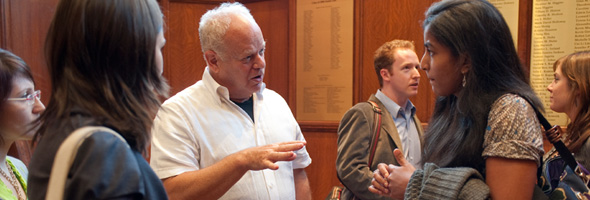I received the following email today (below), and thought people interested in positive psychology might want to know about it if they don’t already. I was involved in a professional development course led by Martin Seligman before the MAPP degree began, and I found him to be an outstandingly engaging speaker with a wealth of knowledge at his fingertips. James Pawelski has a gift of a rare degree of intelligence and practical insight. Students who are able to experience what this program has to offer are fortunate.
 |
 |
| Dear Authentic Happiness Member:
We are happy to announce that the Master of Applied Positive Psychology (MAPP) program at the University of Pennsylvania is now accepting applications for the 2010-2011 academic year. We are looking for the next class to join the more than 190 students who have enrolled Because MAPP is offered on an executive education model, most of our students continue to work full time during the year and commute to Philadelphia – from across the United States and as far away as Mexico, the UK, Sudan, South Korea, Australia and New Zealand! – for the on-site classes. While many students have already earned other master’s degrees or even Ph.D.’s, only a Bachelor’s degree is required for admission. If you hold at least a Bachelor’s degree (or will complete one this spring), have an excellent academic record, and are interested in learning about positive psychology and its applications from leading researchers and practitioners in the field, we invite you to find out more about our program. If you think the program may be a good fit for you, we encourage you to submit an application before the deadline of March 1, 2010. For more information about our program, please visit our website at http://www.pennpositivepsych.org In addition to general program information, the website contains a link to a recorded Virtual Information Session that features input from administrators, professors, and students of the MAPP program. Please feel free to pass this message along to anyone else you know who might be interested in this program. Whatever you choose to do in this New Year, we hope it will be one of authentic happiness for you and yours. Sincerely, Marty Seligman James Pawelski |
|
|
![[Circle]](http://www.meaningandhappiness.com/pictures/GoldCircle36i.png)


